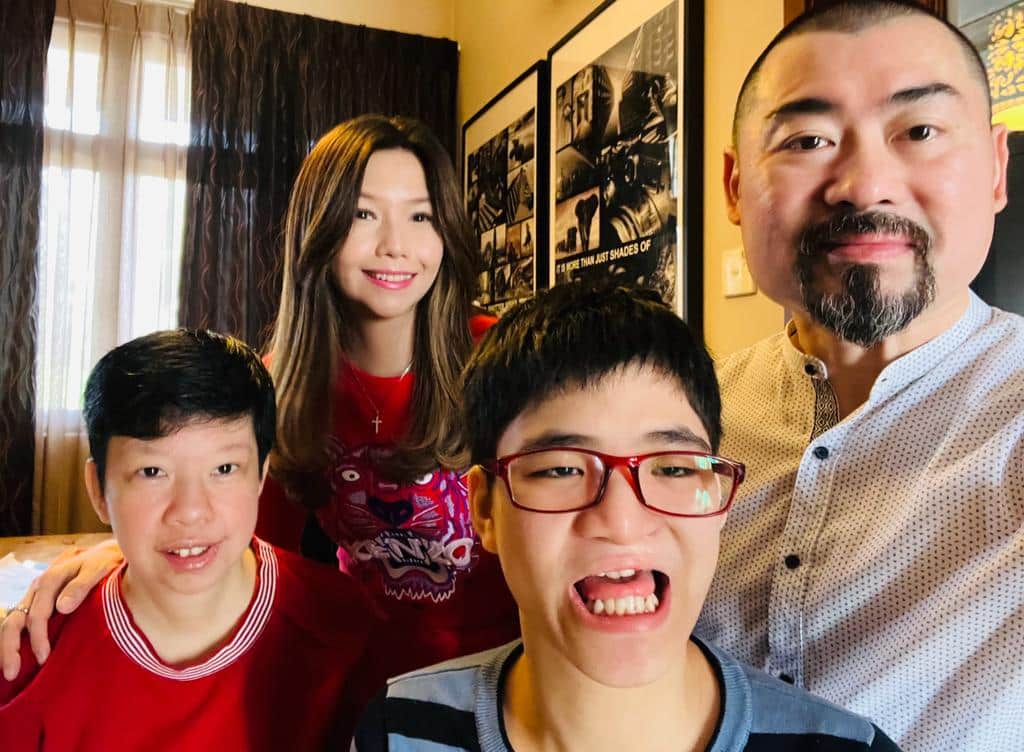He is legally blind, she has no limbs, he was born with bone disorder – yet they share 8 ways God is real: Salt&Light Family Night
by Christine Leow // October 31, 2022, 4:37 pm
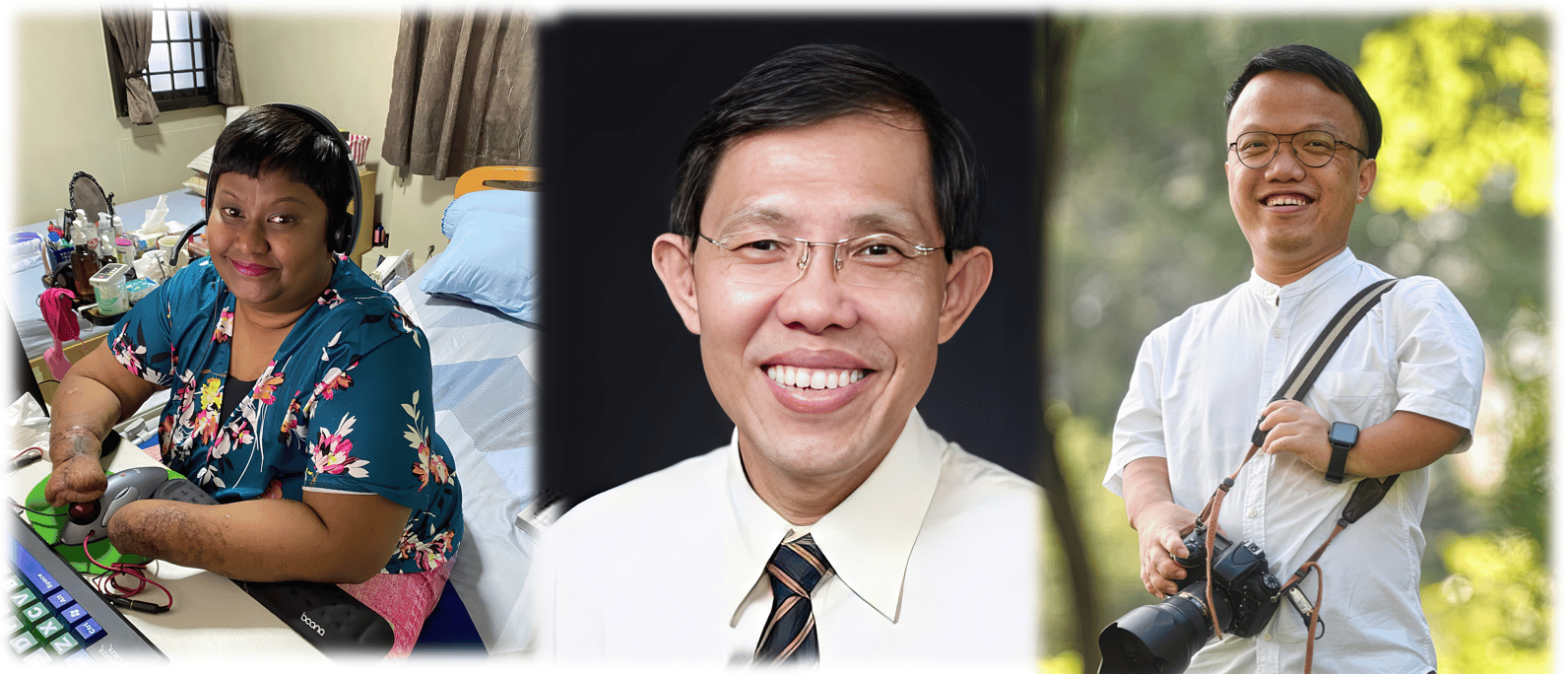
During Salt&Light Family Night, DG Carole Ann, Peter Tan and Joshua Khoo shared their tears, trials and triumphs in the face of disability.
September 4, 2018, was the day DG Carole Ann’s life changed forever.
Until then, she was a perfectly healthy woman. Today, she has no feet and no hands. She moves around using a motorised wheelchair and types with a stylus secured to her wrist.
“Jesus loves me in my ugliness and in my half body, and I accept His love.”
Yet, she declares she is happy and enjoys her life in a way she never did when she was able-bodied and leading a party life of clubbing, drinking and smoking.
“I enjoy my job now, my family, my puppy, my sports.”
The difference, she says, is that now she knows, truly knows, the God who loves her.
“Before this happened, I don’t think I understood God’s love. I just walked with Him like a friend, like a routine thing.
“Right now, today, I know that He loves me. That’s it. Full-stop. Jesus loves me in my ugliness and in my half body, and I accept His love. I walk knowing that He loves me and that’s more than enough, and there is more to come.”
Carole, 44, was among the panellists on the Salt&Light Family Night (October 25) episode on how faith and disability can co-exist. With her were Peter Tan, 62, and Joshua Khoo, 29. Peter, the principal of Queensway Secondary School, is legally blind. Joshua was born with achondroplasia, a bone growth disorder that results in short stature.
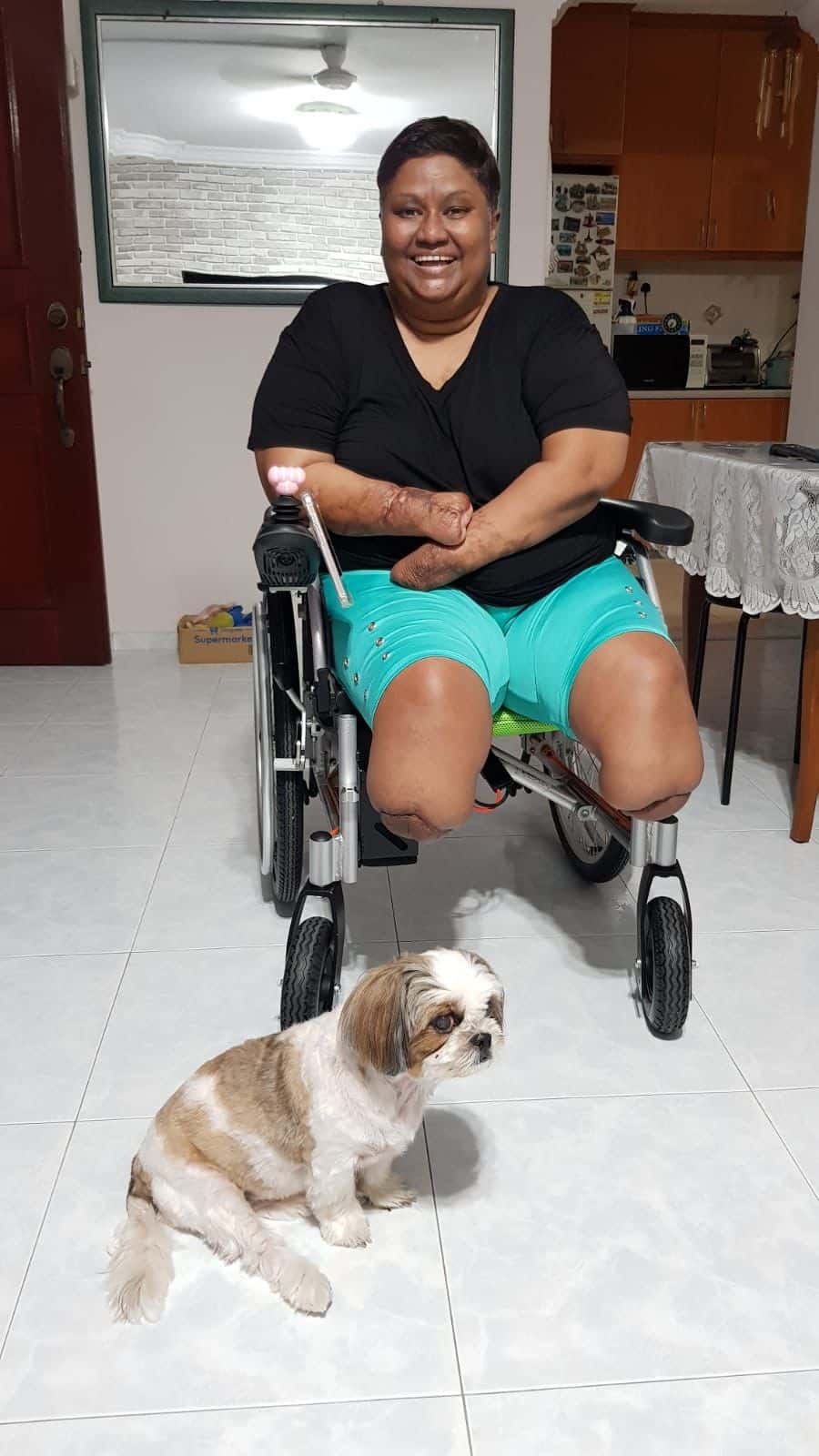
Carole with her dog, whose companionship has been therapeutic for her. Photo courtesy of DG Carole Ann.
Attending the Zoom chat show were over 160 people, 70% of whom were healthy but knew of someone with a permanent medical condition. Nearly one in five “was not feeling well” while 14% had a permanent medical condition.
In an edition that was filled with personal anecdotes of love, faith and hope, the panellists shared 8 ways God was real to them in their disabilities.
1. God assured
Peter has a genetic eye disorder called retinitis pigmentosa (RP) in which retinal cells die. People with RP slowly lose their sight, beginning with loss of night vision. In time, peripheral vision and central vision are affected. Some have trouble discerning colours as well. By all doctors’ accounts, it is untreatable and incurable.
About 20 years ago, when he was in his 40s, Peter started to lose his eyesight. Soon, he had to give up driving. About a decade later, in early 2010, he started to give up hope as well.
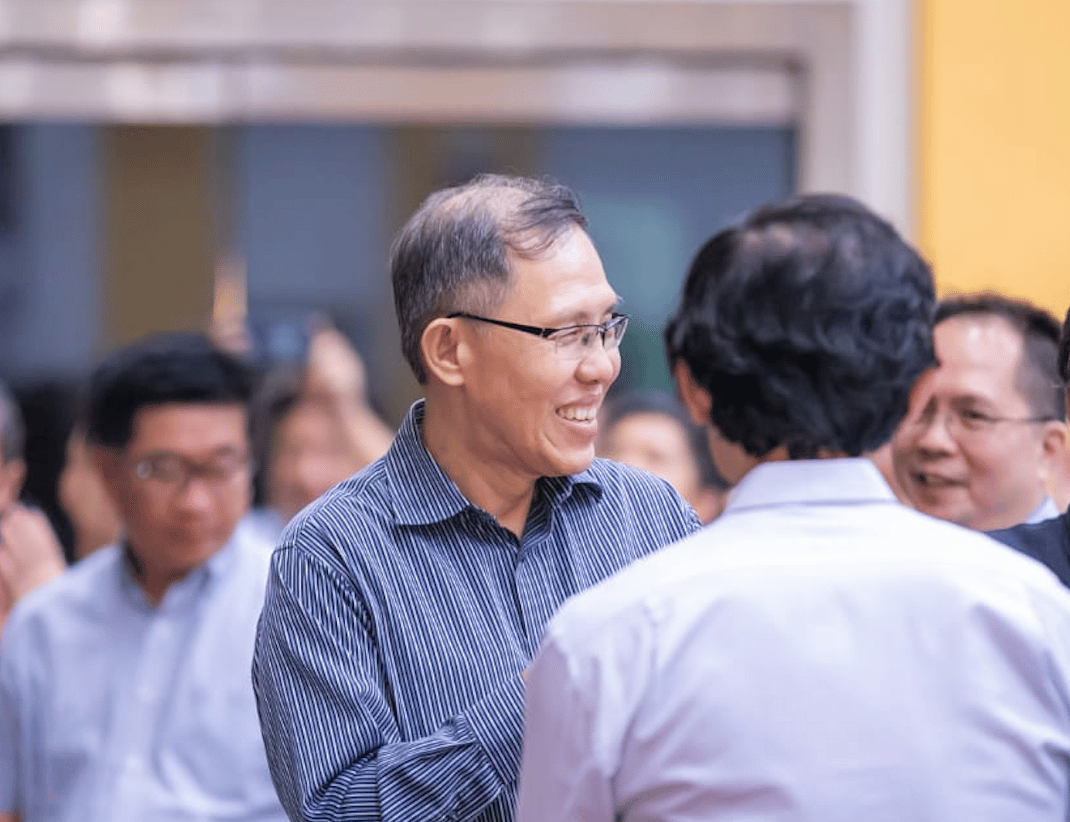
Peter is the principal of Queensway Secondary School where his colleagues have been both caring and accommodating of his deteriorating eyesight. Photo courtesy of Peter Tan.
“One day, I got very down. I was the sole breadwinner in the family. My wife had stopped work for quite a number of years. The future seemed uncertain.”
Despondent, Peter decided to walk to MacRitchie Reservoir.
“I was crying out to God, wondering what life would be like ahead of me. As I was walking, I was praying and listening to my audio Bible, hoping to hear from God, from His Word.”
“That was a very real moment where God actually spoke into my heart and assured me of His love.”
As he wandered the area, he found himself humming a tune and then the following words came out in a song he sung to God:
Where are You God, where are You?
I am Your child and I am searching for You
“That was a cry from my heart. I didn’t’ know what I needed to do or could do. The uncertainty was great.”
Then, in the quiet of the park, Peter heard a tune coming back to him:
I am with you, I am with you
I am your Maker and I have made you
I made you, I am with you
I have loved you and I will always love you
Says Peter of the experience: “At that point, I sat down on a bench. It’s one thing to know the God of the Bible. It’s one thing to serve Him and experience Him. But that was a very real moment when God actually spoke into my heart and assured me of His love, His care.
“I just felt His assurance, that He would take care of my wife, my family and everything would be fine. I went home that day very much more comforted.”
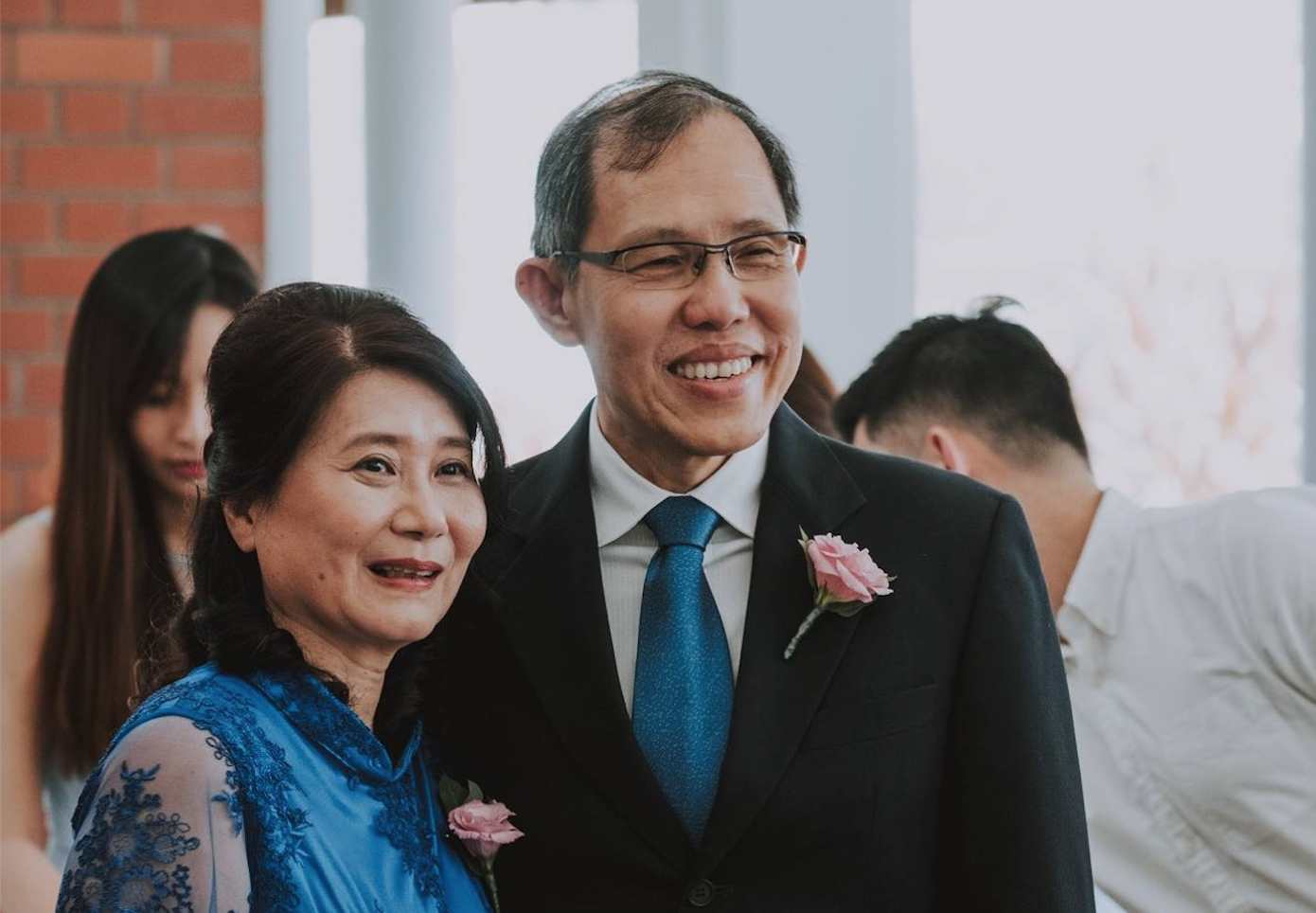
Peter with his wife, Stacey, who has been his pillar of support and now caregiver. Photo courtesy of Peter Tan.
Peter’s eyesight has continued to deteriorate.
But that encounter with God has stilled his soul, so that he can say: “God is good. He journeys with us. In the unknown, you can always turn to Him and He will respond.”
2. God changed her heart
The day that changed Carole’s life began like any other. Then, while getting ready to go to work, she experienced a pain very much like a stomach cramp. It got so bad that she went to the A&E. That was when she discovered that a cyst on one of her ovaries had ruptured and she was in septic shock.
“All my organs were failing. They opened up my stomach to remove as much pus as possible. But it was quite dangerous.
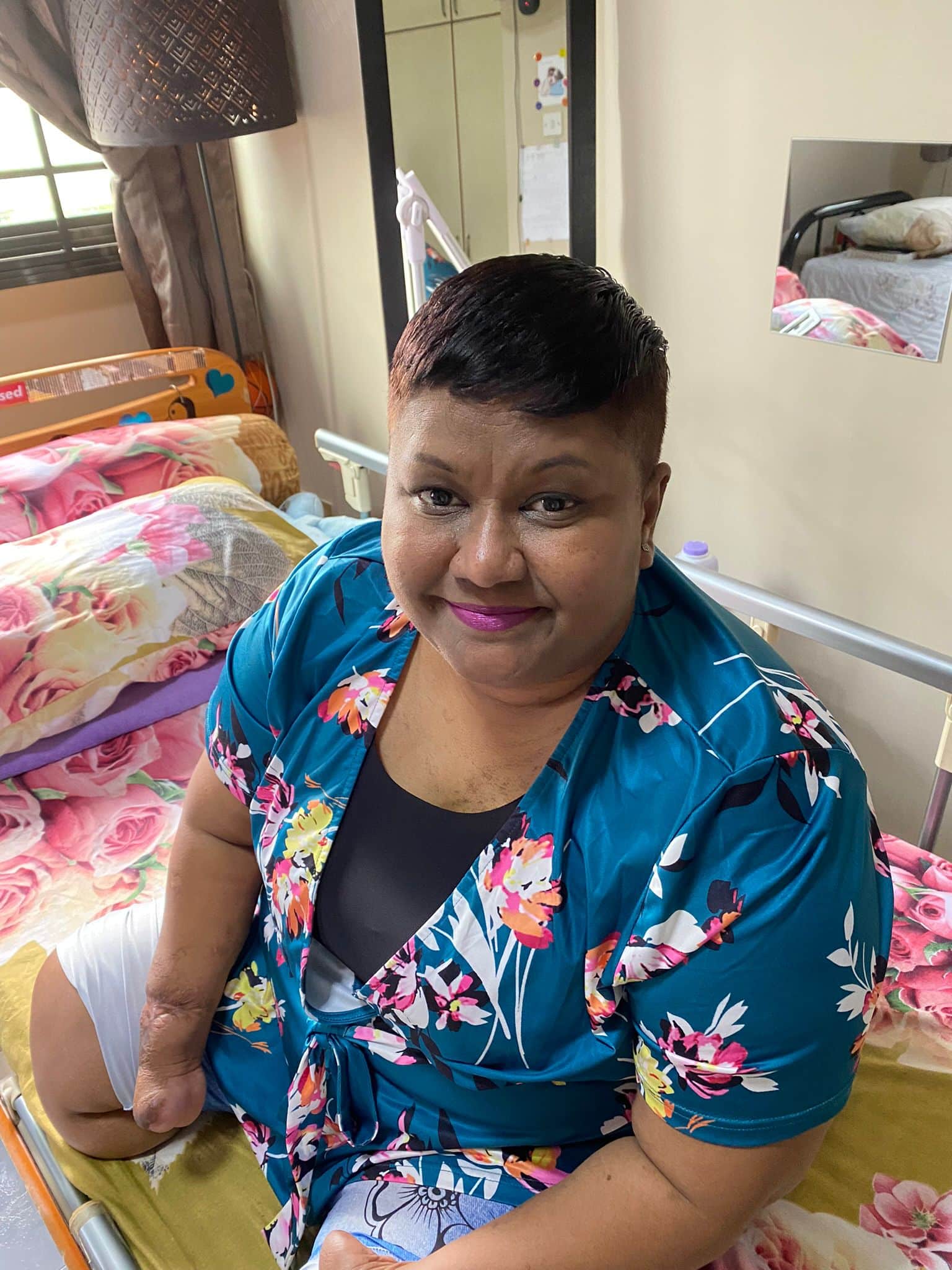
Medication given to save Carole’s life resulted in gangrene in her limbs because of a reduced flow of blood to those areas. All four limbs were eventually amputated. Photo courtesy of DG Carole Ann.
“What they had to do was give me a special drug to suck up all the blood from my extremities. It was a necessary decision to save my life.”
She was put into an induced coma for one-and-a-half months and spent another four months in the ICU. During that time, she suffered two heart attacks, her lungs collapsed twice and her kidneys failed.
“I just rest in You while I go through this long journey ahead.”
“I was close to dying so many times.”
But while her body was failing, God did a wonderful thing for her soul. Born into a Catholic family, Carole had attended Christian workshops as an adult but had not had a particularly close relationship with God until her illness.
“He re-wired my thinking. I woke up from my coma and I realised, ‘You are my Father. I love You very much. I don’t want You to cry for me or be sad. It is what it is right now. It is not from You.
“If I need You, I know You are always going to be there for me. You will bless me and help me in my journey as the seasons come. You will give me the strength. You will even cover the emotions totally so I don’t have to think too much through the process. I just rest in You while I go through this long journey ahead.”
That change of perspective would be a bulwark against what would come later.
3. God guided
Even when she awoke from her coma, Carole’s condition was so critical that her doctor asked her family if they wanted to keep fighting for her or let her go because she was in so much pain.
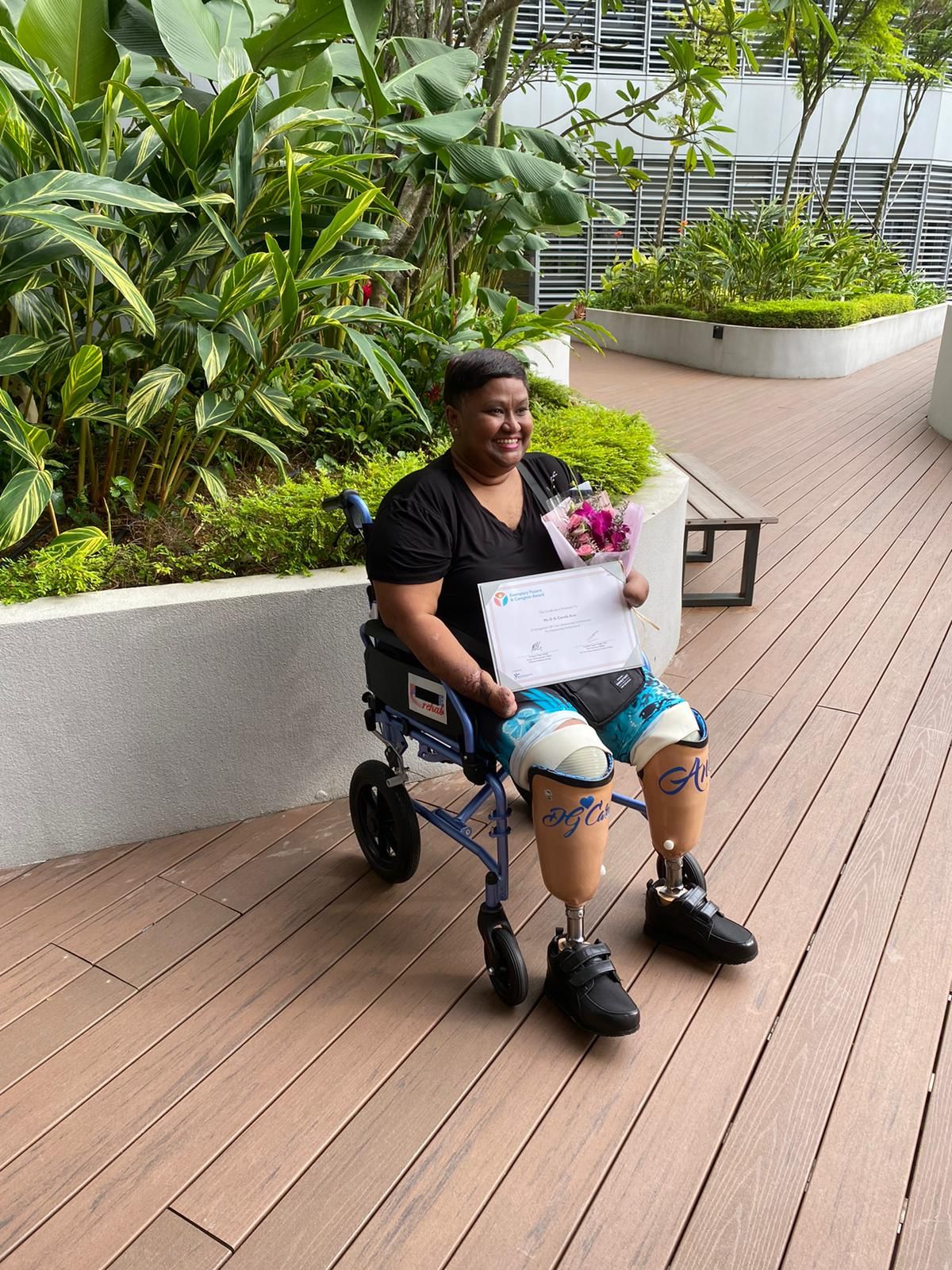
Despite the loss of her limbs, Carole is able to work, play sports and live a life of joy. Photo courtesy of DG Carole Ann.
Meanwhile, the drugs given to treat the septic shock and save her life resulted in a lack of blood flow to all four of her limbs. Gangrene, the death of body tissue, set in. Her hands and legs turned black. Doctors told her family that the best course of action was amputation, but they refused to make the decision. They wanted Carole to decide.
“I was telling my hands and legs, ‘You know you have done your best for me.'”
“It was a very difficult decision for them,” said Carole. “If you make that decision for somebody, you might have guilt for a long time or you might make the mistake of not even deciding. My family was guided in the process. God was very present at that time with each of them.”
Instead of taking the advice of the doctor to amputate, Carole discharged herself from the hospital after another two months in the general ward.
“I was not ready to say good-bye to my hands and legs and I was very confused about the medical issues that were suddenly happening to me. I needed time to pray and seek healing. I made an anointed decision to leave. I know that it wasn’t my decision.”
So, with her hands and legs still blackened and wrapped in dressing, Carole returned home. For five months, her mother and her domestic helper, along with a home nurse, helped her dress her wounds. For five months, she prayed for healing even as she tried to see how she would adjust to life without limbs and asked God for grace to go through the amputation.
Then, slowly, she started to see new flesh form in her hands. Only her fingers remained affected.
God guided her to delay the amputation, giving her hands times to heal.
“I was so overjoyed with hope.”
But after the five months, Carole realised that there was nothing to be done anymore. She decided to go through with the amputation.
“I was telling my hands and legs, ‘You know you have done your best for me. It’s time for you to go back to God, your maker. When you go back, I want to surrender you there to God. I don’t want you to come back and give me any phantom limb problems.’”
Carole has never experienced phantom limb syndrome, a condition in which patients experience sensations, sometimes painful, in their amputated limbs. It happens in nearly all amputees and is often resistant to treatment.
She also firmly believes that God guided her to delay the amputation, giving her hands times to heal. Doctors had initially wanted to amputate her arms up to her elbow because of the severity of her condition.
In the end, she lost only her fingers. With “a stump plus a little makeshift thumb”, she has much better control and is able to type with a stylus. This has allowed her to work from home.
4. God worked a miracle
Carole would see more of God’s hand in her medical condition.
After doctors opened up her abdomen to deal with the burst ovarian cyst, they could not close the incision because her wound had been left open for too long. So, they had grafted a piece of skin from her thigh to cover her stomach area.
“What people had declared impossible, God already had a plan.”
It meant that Carole could not strain her abdomen because “the intestine can come out because it is only covered by skin”. Doctors she consulted simply advised her to wear a binder.
So, she prayed and while at a rehabilitation centre following the amputation, she met a doctor willing to operate on her. After four failed surgeries, the doctor was able to successful close her abdomen on the fifth attempt.
“What people had declared impossible … God already had a plan for me in 2020.”
Carole now lives an active life and recently took up wheelchair rugby.
“It is a man’s game. But I have the size and the build. Why not get active? I never joined sports before. It was never a thing I wanted. Now, I enjoy it.”
5. God showed His love
Despite losing her limbs, Carole did not lose her faith. In the fact that He saved her fingers, in the fact that He led her to a doctor who could operate on her abdomen, in the joy that He has given to her in her life, Carole has realised that when given a chance, God is always willing to “show you that He loves you”.
“We must understand that when we say that Jesus loves us, for me personally I tell myself, ‘Then you have to believe that Jesus loves you.’
“He is Somebody you will not regret believing or loving or trusting.”
“I always go back to: Jesus loves me. And if He loves me, I am not ‘less than’. I am a king, I am a priest, I am a child of God. The God that I serve loves me mightily. That ministers to my heart to keep me going every day.”
She recounts another example of God’s great love for her. When she woke from her coma, despite the severity of her condition – “everything was wrapped up and I couldn’t even lift my hand” – she had but one question to ask the nurse: “My liver how, ah?”
She had been a heavy drinker and had thought that if any part of her body was damaged, her liver would be the one that would have been most damaged. But the nurse told her that her liver was fine.
“God was talking straight to my heart. It was as if He was saying, ‘Every part of you will break down but I will save your liver so you know you don’t deserve it, but My handprint is on it.’
“He is Somebody you will not regret believing or loving or trusting. He will find your deepest desire and He will work on those. He will knit it together and give it to you and you will know this is from God.
6. God gave gifts
From the time he was born with achondroplasia, Joshua faced many difficulties. His condition caused his bones to be so weak that he could not sit up and he did not take his first step till he was four.
His parents had a hard time enrolling him in a kindergarten.
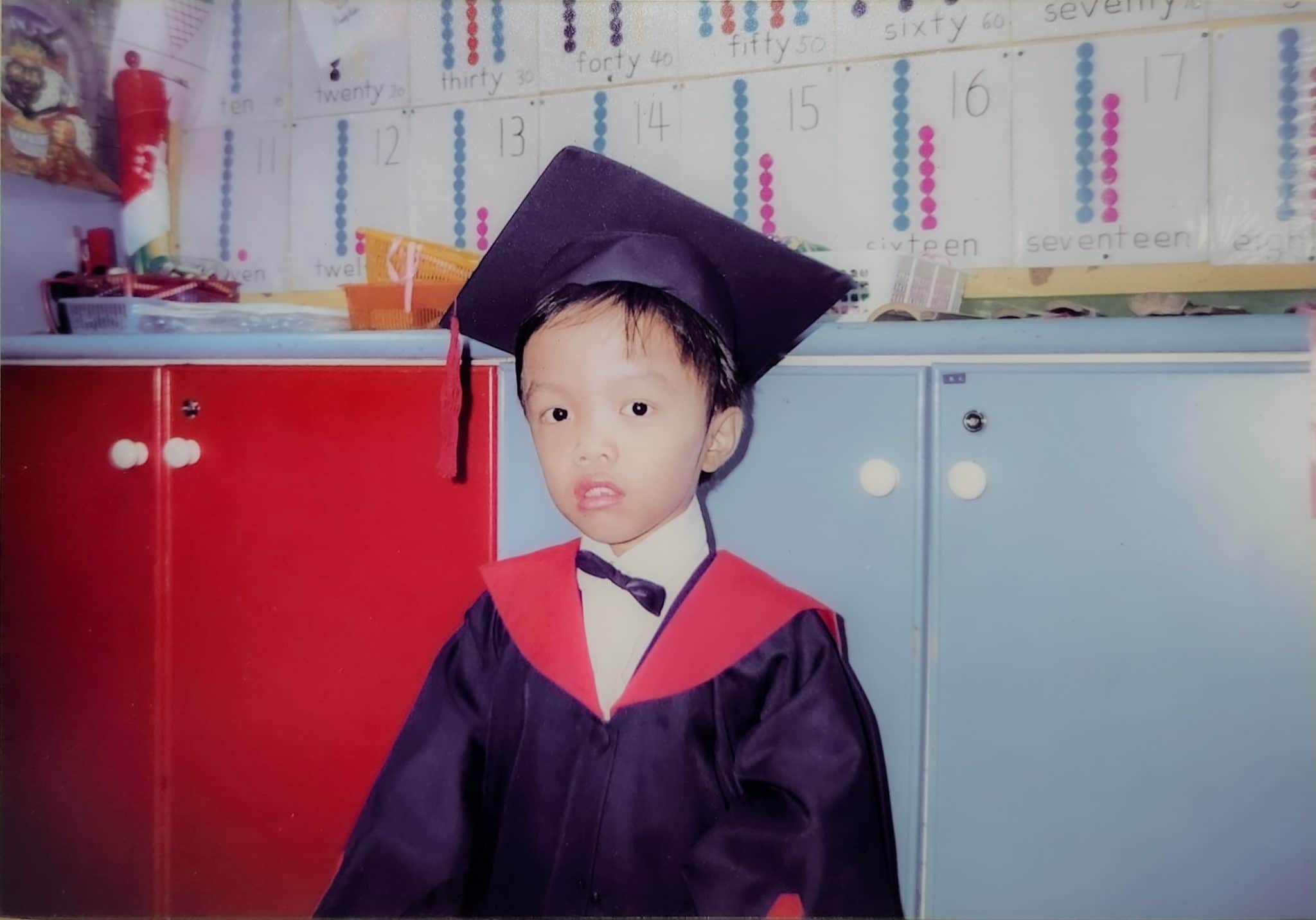
Joshua eventually found a place in a Methodist kindergarten. His parents wept with joy at his graduation concert when he danced as part of his class performance. Photo courtesy of Joshua Khoo.
“The kindergartens did not have the facility and ability to accept kids with this kind of condition. They did not want to take the risk because if something major happens to me, for example falling down in school, they don’t wish to take the responsibility.”
“God has continually, graciously opened doors for me.”
When he was in primary school, he realised that he had a learning difficulty which made it hard for him to cope well in a mainstream school.
“I was almost failing in every subject. It came to a point where I reflected on what the purpose was of having God in my life. What do I do with my life with very bad academic results?”
Then, at age 11, he discovered that God had given him a gift. He could drum even though he had never taken a single music lesson. He started serving in the worship team in his church as a percussionist.
“That was when I committed my life to Him, knowing that He would be there for me.”
When he entered ITE, he discovered God’s second gift to him. He could take beautiful photographs. Many were sceptical of his ability because, at 1.3 metres, there was always the very real possibility that he would be blocked by people of regular height.
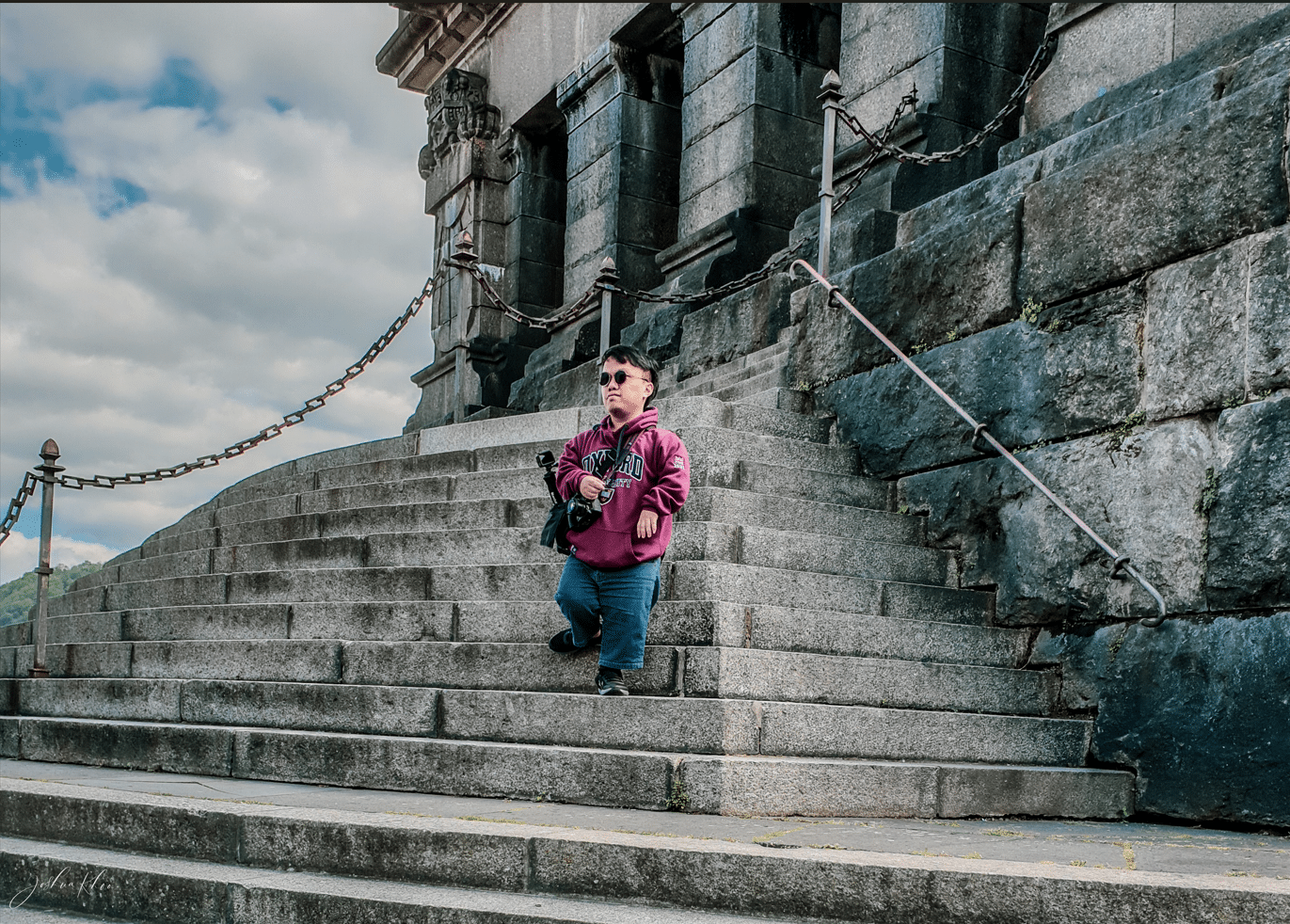
Joshua has carved a career for himself as a freelance photographer. Photo courtesy of Joshua Khoo.
“But God has continually, graciously opened doors for me. I was able to show the world that photography is based on a skill set,” says Joshua who relies on Psalm 28:7-8 because it promises that God is both his strength and shield.
Focusing on his gifts instead of his condition has spurred Joshua on in life and given him a renewed sense of purpose. He set up a social group to advocate for the support, education and hope for people with achondroplasia.
Little Mighty Warriors now has 10 families as well as 10 adults and students.
“I open up a platform to allow them to speak and meet me in person, and allow them to share their struggle which they may find very difficult to share with their parents because they feel they are not able to connect.”
7. God enabled
Adds Peter: “My encouragement to those who have a disability or any physical challenge is really that disability is also a state of mind.
“Disability is also a state of mind. If we choose to live in that state, we have imprisoned ourselves.”
“If we choose to live in that state, we have imprisoned ourselves.”
Peter knows this first hand.
Despite the fact that his eyesight started to fail him since he was in his 40s, he wanted to complete a marathon before he turned 50.
God brought a group of good friends alongside him who took him on runs and trained with him.
“I completed two marathons before I turned 50. If we say we can’t do it, we can’t do it. But if we believe we can, we can.
“Just go out and enjoy the life God has given you.”
8. God offered hope
Although Peter has prayed many times and has had many pray for him, he has yet to have his eyesight restored.
“When we return to our heavenly Father, He will give to us the body that allows us to worship Him in fullness.”
But he is not short on hope.
He explains why: “Many years ago, I had a dream. In this dream, I was brought into this huge, huge hall. You can’t even see the end of it.
“There were just people from end-to-end worshipping God together. Millions and millions of people together in this big room. An angel led me into another room.
When he opened the door, the room was totally dark. But I could see everything.
“When we return to our heavenly Father, He will give to us the body that allows us to worship Him in fullness. I look forward to that.”
This report is Part 1 of the Salt&Light Family Night episode: How can my disability and my faith co-exist? Look out for Part 2 of the report soon.
A full recording of this episode will be available at the end of the week. You can watch past episodes of Salt&Light Family Night on our YouTube channel here.
RELATED STORIES:
How do we enable differently abled persons to be full participants in the community of faith?
Beyond access ramps, “Let Us Consider” how to truly include the differently abled
We are an independent, non-profit organisation that relies on the generosity of our readers, such as yourself, to continue serving the kingdom. Every dollar donated goes directly back into our editorial coverage.
Would you consider partnering with us in our kingdom work by supporting us financially, either as a one-off donation, or a recurring pledge?
Support Salt&Light
